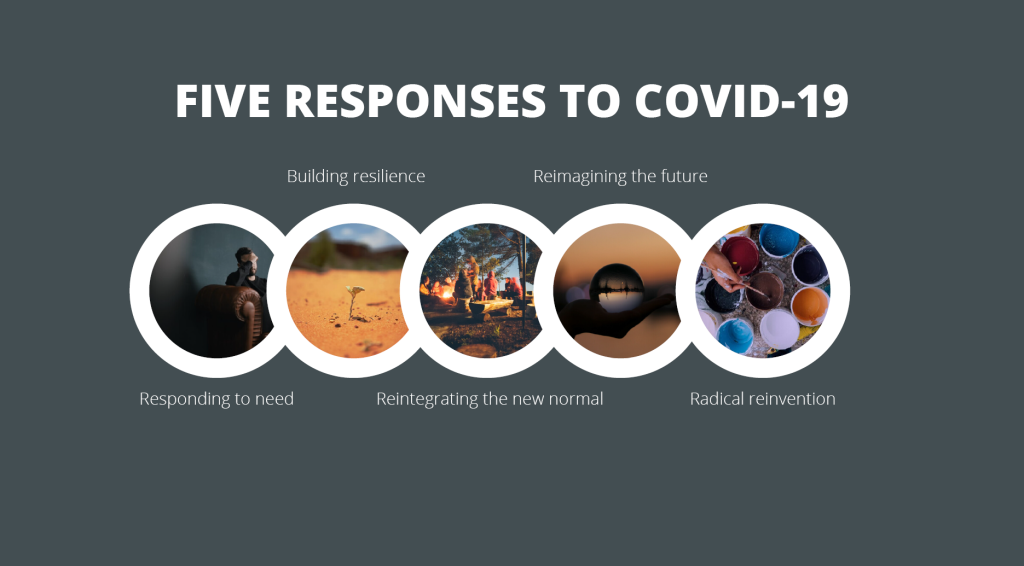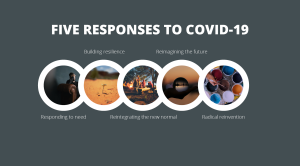We are living in a world that only a short time ago was an unimaginable future.
We are making it up as we go along. We are getting through. We are developing our crisis muscles and stretching them. I feel excited, sad, helpless and overwhelmed depending on the last challenge and my ability to respond. And soon I will be operating from muscle memory, an approach that every now and again needs to be reviewed so that I continue to bring the best I can.
We all need help. We need each other, perhaps now more than ever before. The organisation I work with is doing its best to serve the I, the We, the All of Us, and we celebrate all that everyone is doing, in what way they are doing it. There are 5 responses to Covid that are key.
This blog is about 5 responses and an emerging framework that I hope might be a resource to help you take a breath, locate where you are, and what might be worth giving attention to. In each response mode, I’ve tried to offer a felt sense of what might help you when it comes to supporting people, supporting yourself and sustaining relationships at the heart of your response.
1. Responding to Need
‘Adapt, recharge, and stay well through tough times’
Faced with a high level of need, the requirement is to adopt ways of working, expand capacity and minimise constraints on resources. Many are responding by providing help, some are simply retreating to cope. The context is fast-changing and shapes all responses – how we make sense of our context becomes central – and if we can’t make sense of it, we will feel vulnerable, scared, angry or sad.
This is the aspect that many leaders are focussed on, not just the practical needs but the emotional demands that so often shape and influence any outcomes.
Whatever your sector, the key areas for focus are proving to be:
- leaders modelling resilience and sensitivity and not compounding the crisis;
- addressing the current and changing needs of your clients, customers and key stakeholders;
- recognising and appreciating what people are managing, contributing and achieving;
- protecting each other and those you have responsibilities for;
- minimising financial impact;
- stabilising the supply chain, whether materials, volunteers, or services; and
- co-ordinating, communicating and decision making for critical areas.
This is all about making meaning of the emerging realities, determining what needs to be done, and building shared commitment to act on whatever is decided. The latter can, over time, be the most demanding. Whether this refers to the demands of working from home, or sustaining the NHS, we are all in it. And at the same time, we are experiencing loss and trauma at an immense scale.
What can help:
- Put People First – work with the whole person by providing time and approaches that help to recharge, adapt and stay well through tough times. Creating a space to make sense of conflicting and vast amounts of information.
- Stay Connected – Facilitating small- and large-scale participation and conversation processes.
- Equip and encourage key decision-makers and team leaders to effectively face into difficult conversations, enabling tough decisions whilst building connection and relationship. Designing opportunities to slow down, digest and explore the best course of action for you, your team, your organisation and community.
- Support the supporters. Activating skilled practitioners in virtual open and closed group supervision, 1-1 key support and coaching, inquiry-based support, and action learning. Being alert to signs that trigger more focussed support and engagement.
Responding to what’s needed and being resilient (realistic) are critical partners when the pressures are relentless
2. Building Resilience
Learning how to make falling down and getting up one action.
Our whole system is facing resilience questions in relation to ourselves, our livelihoods, the economy, environment, social stability and political approaches. We know unerringly that people need people. A key factor is the connective tissue that sustains each of us and the communities we live within. One of our partners, The International Bateson Institute, expressed this beautifully,
‘The more contact, interaction, interconnection, interdependence you are entwined in — the healthier, happier and safer you are.’
Learning how to learn when immersed in change is the foundation of sustaining our resilience, whether in our family, our workplace, or our community. For some this isn’t a need, they have already learned how to navigate uncertainty in turbulent times. These people aren’t feeling psychologically vulnerable, disoriented or demonstrating anxiety driven reactions, they know how to look after themselves and do. They are prepared and ready to support others. But for many of us this isn’t the experience. We see isolation and independence as risky; we seek interconnectivity and interaction, we create structures to provide security, and when our structures are breaking down, we don’t feel safe enough.
What can help?
‘We know that whatever we build together we care more about.’
- Create rich virtual connection points – effective facilitated spaces for people to relate to each other that allows the connections, stories, needs and responses to unfold.
- Equip people to cope who don’t feel ready, are feeling overwhelmed, and are not even sure where to begin. We recognise change doesn’t come with one injection, and it is important to provide rhythmical approaches that nudge and build new ways of coping over time.
- Find and develop bridges – people who can link, support and co-ordinate; who can facilitate groups to find answers for themselves and shape more bespoke responses that are flexible, innovative and needs based.
- Strengthen your internal support systems – develop an internal coaching provision.
- Enable teams to function and collaborate in the most challenging of circumstances. Find team coaches who can bring applied competence to work with high levels of uncertainty and unpredictability – it makes a tangible difference to managing the unknown. Develop practical strategies and processes to be great at virtual teaming.
- Shape virtual services mindful that technology will enable us to continue our relationship with our clients and communities, and at the same time bring challenges. Work in ways to pattern hope and experimentation to enable a more resilient future to emerge.
- Join a support network of like minded and differently minded peers.
- Provide counselling and bereavement support to help people grieve and discover the first tentative steps towards healing. The grieving won‘t only be about our family and friends, it will be far wider as we learn to let go of aspects of our life and work, we have held core to who we are.
- Communicate well, often enough, with warmth and in ways that reflect your values. Without your values to guide you, what is left?
3. Reintegrating into the new normal
Going back to before is not an option
Once the true loss of what we’ve been through is recognised, once it’s time to return to what there is, what then? It’s not a switch or a ‘resume’ button where we pick up where we left off, people don’t work like this and neither do the systems we live within, it will take time. There will be the uncertain challenges of further waves of infection. There will be government decisions and shifts in supply and demand. Customers and clients will have developed new patterns of behaviour, as will each of us in our individual readiness to any next phase.
When it’s time to implement a return and reintegration of people and ways of working, we’ll be faced with very human questions, such as,
- How do I work with the new expectations and requests?
- Now it’s over, given what’s changed in me, how do I re-enter a very different world?
- How have I been treated and what’s next for me?
- How do I shape a space for authentic reconnection?
- How do I facilitate what’s been learned and make sense together of what that means?
What can help?
- Think ahead – how this phase is managed and held will shape our relationships for a long time. It needs the capacity to step back and think and sense our way, without jumping to the obvious or an escape to health that minimises the complexity of what will be faced and the psychological underworld of what it will generate.
- Sustain the rhythm of connection
- Make meaning and allow as many people as possible to influence the changes that will impact them
- Listen deeply
- Build in agility – leaders particularly are going to be called on to let go and embrace new possibilities
4. Reimagining the Future
If you’re a leader in the midst of crisis management, don’t even read these sections, it will only irritate and frustrate. But when there is less pain and distress, it may awaken possibilities and options.
At a systemic level there are changes that are proving healthier for the planet, are allowing us to discover what is essential, are reshaping the political and economic landscape, are shifting social cohesion, are sowing the seeds of significantly different ways of working. The changes are awakening imagination to what can be, because we are acting into a future that is already happening.
Our ability to shape our future is only limited by our imagination and our ability to work together.
As space eventually emerges from the frenetic doing, there will be a call to consider what the options are for our future. Such future thinking can be limited by a poverty of imagination, a reluctance to learn or an inability to turn away from the addiction of busyness. Without unlocking dreams, possibilities and intentions there will be a risk of the pretence of getting back to how it was, a return to normal, as if that were possible.
There are processes that can help individuals, groups and organisations to make meaning of what is emerging and of what can be created together. To unlock the imaginal capabilities through creative and future picture approaches. To co-produce workable actions to make medium- and long-term change.
Our imagination is only limited by how safe we feel to go further than before
What we are facing is chillingly close to what has been acknowledged as a possibility for decades, just without the ability to be physically close. Meaningful action, the capacity to integrate thinking, feeling and intention, greater connectivity and the ability for the person and the system to learn will be key to a resilient and more compassionate world.
We co-create ‘safe enough’ environments for people to dream, to imagine, to act into new ways of thinking.
What can help?
- Allow the whole system to learn and innovate – utilise emerging methods to work with complexity through relationship.
- Use collective intelligence – establish inquiry cycles to address and resolve questions that don’t have ready made answers
- Be prepared to be wrong – and be open to new opportunities and atypical partnerships.
- Collaborate for innovation – participate in innovation cohorts, locally and globally
- Make space to gather emerging trends and principles – learn whilst doing and apply co-discover methodologies, such as collaborative inquiry and facilitated futuring sessions engaging single and multi-sectors.
- Find a critical friend – a ‘possibility catalyst’, a ‘what if’ approach, explore the art of the possible.
- Bring more of your whole self – your imagination, your creativity, your sense of humour, all you value and what you’ve learnt.
5. Radical Reinvention
It is easier to act our way into a new way of thinking than to think our way into a new way of acting.
The radical reinventing response has the immense possibility for enacting and embedding ways of working that make sense for people and planet, that build resilience and connectivity, that reduce waste and contribute to establishing the world we want to create.
We are all living radical reinvention. It will not go away. It is the implementation phase of what we or someone else has imagined might work. That new way of doing something, that new offer, that disruptive technology.
The coronavirus is a disruptive force, it is causing us to act differently, from nation state to individual. The person and the system is having to learn fast. We are failing quickly and moving on, falling down and getting up again is one action.
Organisations and people who reinvent in ways that respond to what we are experiencing will be pioneers of new ways of working that will succeed over others – maybe!
The risks are many, for just as quickly as we have changed over the last weeks and months, we may revert to how we worked before, taking solace and security in the familiar. We already know that what people turn to in the first few days, will be quickly forgotten. A little like the plan to visit the gym regularly as a New Year resolution. But some things may stick, greater confidence and skill at meaningful virtual conversations, and the acknowledgement that the internet is a utility not a luxury. There could be a reduction in unnecessary travel and environmentally damaging activities. It may be time for a more local and resilient supply of food and services. A different response to the calls for flexible working and childcare and the technology and skills to make them possible, and so on. Organisations that have removed what are crisis based non-essentials may be reluctant to reintroduce them because the emerging short-term model is far more efficient and profitable, despite the potential long-term consequences.
What can help?
- Embed change through relationship – employ new practices that place people and planet at the heart of all you do
- Steal emergent ideas proudly – be connected across sectors and mindsets
- Develop agile leaders at all levels in your setting, equip them to influence and facilitate change wherever they are
- Develop change-makers, facilitators and coaches who can help transform potential energy for change into meaningful action
- Enable whole systems, organisations and people to learn through action – facilitate prototyping, ‘do-tanks’ and intrapreneurship
- Translate all that has been learnt into leading-edge practice
- Be bold and embrace the previously unimaginable
To offer an accessible framework linked to possible options and ideas, this blog has been translated into a microsite #COVID19 ‘Navigating Uncertainty’. I can’t express enough my appreciation to all who have helped this work come to fruition particularly the RAW Network, Oasis associates and our amazing clients.
A Portuguese translation of this blog can be found HERE
Nick Ellerby is co-founder and co-director of The Oasis School of Human Relations. He serves as an adviser to a number of organisations on the frontline, and to leadership and global networks including the Globally Responsible Leadership Initiative. Oasis is a learning organisation that provides human relations practice and facilitation for people, organisations and communities.
For more insight into our work on navigating change and uncertainty through COVID19, visit our microsite. To enquire about a course, please fill this form in.











